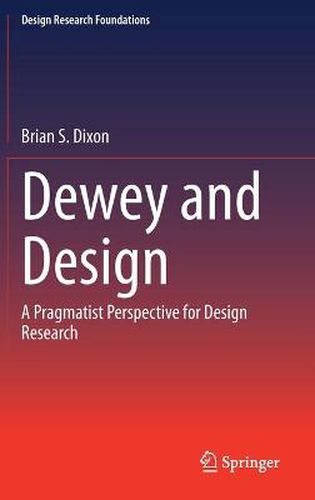Readings Newsletter
Become a Readings Member to make your shopping experience even easier.
Sign in or sign up for free!
You’re not far away from qualifying for FREE standard shipping within Australia
You’ve qualified for FREE standard shipping within Australia
The cart is loading…






This title is printed to order. This book may have been self-published. If so, we cannot guarantee the quality of the content. In the main most books will have gone through the editing process however some may not. We therefore suggest that you be aware of this before ordering this book. If in doubt check either the author or publisher’s details as we are unable to accept any returns unless they are faulty. Please contact us if you have any questions.
Over the last four decades, John Dewey’s pragmatist philosophy has formed an intellectual core in design research, underpinning Donald Schoen’s theory of reflective practice, the experiential perspective in HCI and the democratic commitments of participatory design. Taking these existing connections as a starting point, Brian Dixon explores how deeper alignments may be drawn between Dewey’s insights and contemporary design research’s concern with practice, meaning and collaboration. Chapter by chapter, a fresh intellectual approach is revealed, one which recognises the transformative power of doing, making and knowing as a force for positive change in the world. We see that, for Dewey, experience comes first. It connects us to surrounding world and the society of which we are part; good things can happen and new realities are possible-we just have to work for them. The implications for design research are vast. We are offered a new way of understanding designerly knowledge production, as well as the methodological implications of adopting Deweyan pragmatism in design research. Taken as a whole, Dewey and Design not only draws out the value of Dewey’s work for design research but also, crucially, offers a clear articulation of the value of design itself.
$9.00 standard shipping within Australia
FREE standard shipping within Australia for orders over $100.00
Express & International shipping calculated at checkout
This title is printed to order. This book may have been self-published. If so, we cannot guarantee the quality of the content. In the main most books will have gone through the editing process however some may not. We therefore suggest that you be aware of this before ordering this book. If in doubt check either the author or publisher’s details as we are unable to accept any returns unless they are faulty. Please contact us if you have any questions.
Over the last four decades, John Dewey’s pragmatist philosophy has formed an intellectual core in design research, underpinning Donald Schoen’s theory of reflective practice, the experiential perspective in HCI and the democratic commitments of participatory design. Taking these existing connections as a starting point, Brian Dixon explores how deeper alignments may be drawn between Dewey’s insights and contemporary design research’s concern with practice, meaning and collaboration. Chapter by chapter, a fresh intellectual approach is revealed, one which recognises the transformative power of doing, making and knowing as a force for positive change in the world. We see that, for Dewey, experience comes first. It connects us to surrounding world and the society of which we are part; good things can happen and new realities are possible-we just have to work for them. The implications for design research are vast. We are offered a new way of understanding designerly knowledge production, as well as the methodological implications of adopting Deweyan pragmatism in design research. Taken as a whole, Dewey and Design not only draws out the value of Dewey’s work for design research but also, crucially, offers a clear articulation of the value of design itself.